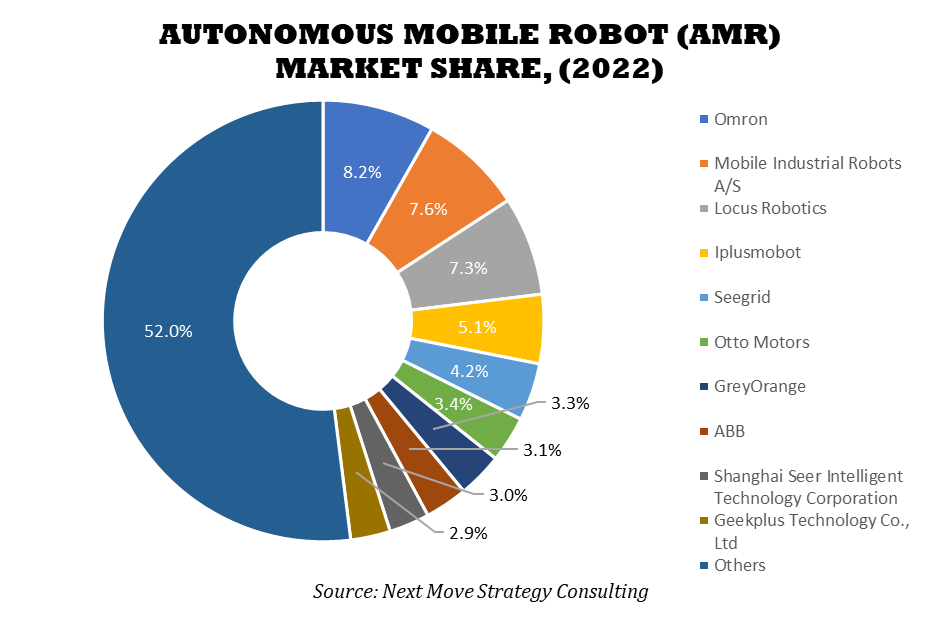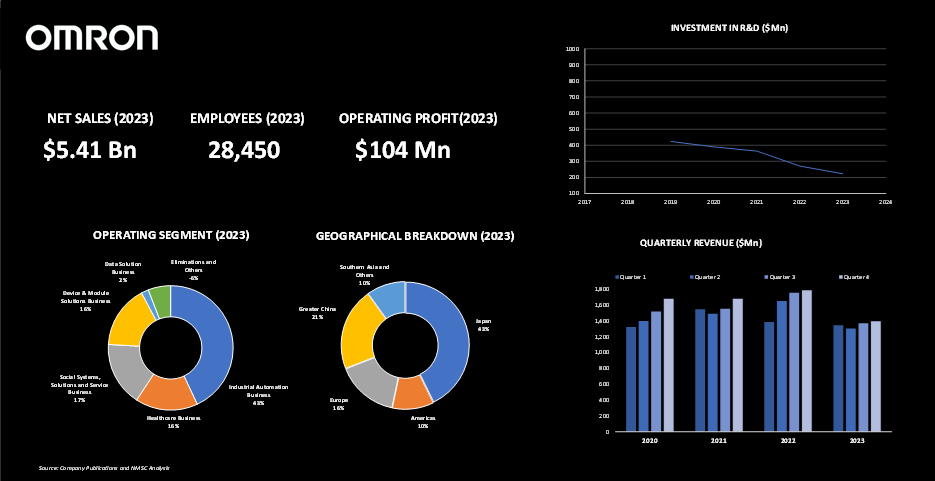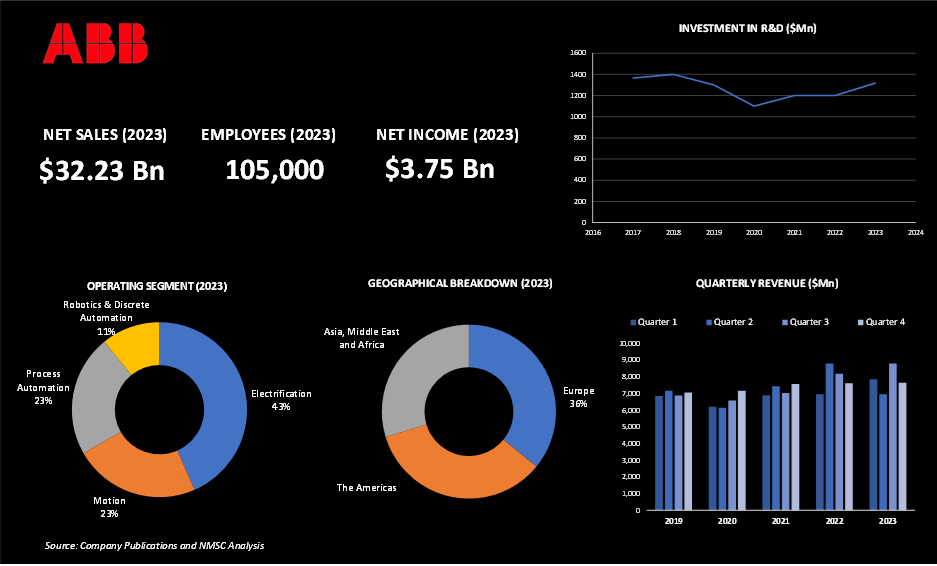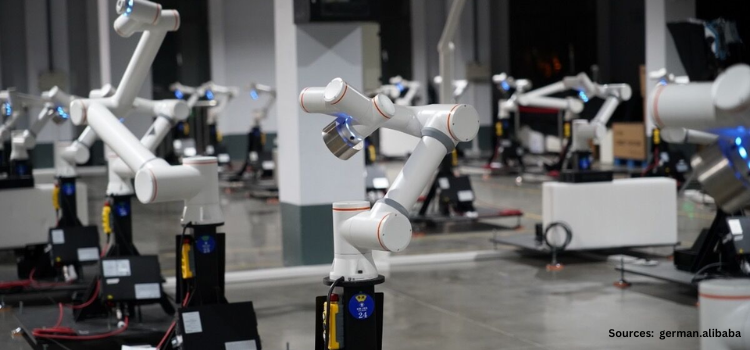Omron, Mobile Industrial Robots, and Locus Robotics Command 23% Of the AMR Industry – Here's how they Achieved it
15-Feb-2025
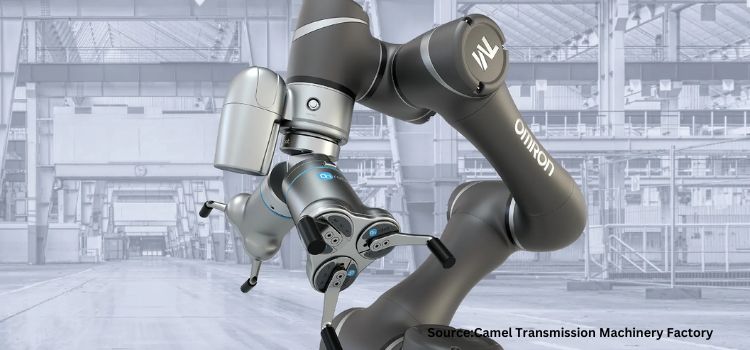
According to the NMSC analysis, the autonomous mobile robot (AMR) market was valued at USD 1.24 billion in 2023, and it is anticipated to experience substantial growth, reaching USD 3.13 billion by 2030. This projected expansion, representing a growth of approximately 1.5 times over the forecast period, is driven by the increasing adoption of robotics across various key industries. Sectors such as automotive, electronics, and food and beverages are increasingly integrating AMR technology to enhance operational efficiency, streamline processes, and meet growing consumer demands. The widespread implementation of these robots is a response to the need for more agile, cost-effective, and scalable solutions in production and logistics. As industries continue to recognize the benefits of automation, the AMR market is poised for significant growth, further accelerating the transformation of traditional manufacturing and distribution practices.
AUTONOMOUS MOBILE ROBOT MARKET OVERVIEW
The AMR market is witnessing significant expansion as industries across the globe seek to enhance efficiency, reduce operational costs, and navigate labor shortages through automation. AMRs are robots equipped with sophisticated sensors, cameras, and onboard computing systems that enable them to perceive their environment, make decisions in real-time, and autonomously navigate dynamic and unstructured environments. Unlike automated guided vehicles (AGVs), which rely on fixed infrastructure such as magnetic strips or wires, AMRs use advanced technologies including simultaneous localization and mapping (SLAM) to move freely within warehouses, manufacturing plants, hospitals, and retail environments. Key drivers of this market include the growing demand for e-commerce, which has led to a surge in warehouse automation, and the need for flexible manufacturing systems in industries such as automotive, electronics, and consumer goods.
Challenges in the AMR market include high initial investment costs, integration with existing systems, and the need for continuous software updates to handle new tasks and environments. However, advancements in AI, cloud computing, and the Internet of Things (IoT) are expected to overcome these barriers, enabling more widespread adoption.
Key players within the market includes Omron Corporation, Mobile Industrial Robots A/S, Locus Robotics, Iplusmobot, Seegrid, Otto Motors, GreyOrange, ABB Ltd., Shanghai Seer Intelligent Technology Corporation, and Geekplus Technology Co., Ltd each contributing significantly to the industry's evolution.
For the latest market share analysis and in-depth autonomous mobile robot industry insights, you can reach out to us at: https://www.nextmsc.com/autonomous-mobile-robot-amr-market/request-sample
HIGHLIGTS OF OMRON CORPORATION
OMRON Corporation, headquarter in Kyoto, Japan is one of the prominent players in the autonomous mobile robot (AMR) market experienced a shift in its financial performance, with revenue declining to USD 5.41 billion in 2023 from USD 6.57 billion in 2022 and the operating profit stood at USD 104 million in 2023. This decrease in revenue coincided with a significant drop in net income, which fell to USD 53.6 million in 2023 from USD 554.6 million in the previous year. Despite these challenges, OMRON's diverse operational segments demonstrate its broad scope in the automation and robotics fields. The company's industrial automation business, which is a key driver of its AMR initiatives, generated USD 2.63 billion. The healthcare business contributed USD 991.9 million, while the social systems, solutions, and service business brought in USD 1.02 billion. Additionally, the devices & module solutions business accounted for USD 1 billion, and the data solution business provided USD 115.6 million.
Geographically, OMRON's revenue distribution in 2023 highlights its global reach, Japan remains the largest market, contributing USD 2.30 billion, followed by Greater China with USD 1.13 billion. Europe generated USD 852.5 million, Southeast Asia and other regions accounted for USD 533.7 million, and the Americas contributed USD 569.4 million. Direct exports were relatively minor at USD 13.9 million.
OMRON employs approximately 28,450 people worldwide, reflecting its substantial global presence. The company's commitment to innovation is evident in its increased R&D investments, which rose to 6.9% of sales in 2023 from 6.3% in 2022. This focus on research and development underscores OMRON's dedication to advancing technology and maintaining its competitive edge.
Sales in fiscal 2023 saw a 7.0% increase compared to the previous year, indicating a positive trend despite the overall revenue decline. In addition to its financial and operational activities, OMRON has strategically positioned itself in the healthcare sector through a notable partnership. In February 2022, the company entered a capital and business alliance with JMDC Inc., aimed at enhancing healthcare solutions using data-driven methods. As part of this alliance, OMRON acquired a 33% stake in JMDC, a company specializing in medical statistics data services.
Through these strategic investments and alliances, OMRON continues to strengthen its position in the AMR market, integrating advanced robotics technologies and expanding its capabilities across various sectors to drive efficiency and innovation globally.
HIGHLIGTS OF ABB LTD.
ABB Ltd., headquartered in Zurich, Switzerland, is a significant force in the AMR market, reporting a revenue of USD 32.23 billion in 2023, a 9% increase from the previous year, alongside the net income accounted for USD 3.75 billion. This financial growth highlights ABB's strategic focus on expanding its automation and robotics capabilities to meet the rising global demand for advanced mobility solutions. The company’s portfolio includes cutting-edge robotics, integrated automation systems, and sophisticated electrification technologies, all tailored to address the evolving needs of modern industrial environments.
ABB’s commitment to innovation and market expansion is evident through substantial investments, such as a USD 170 million initiative in the U.S., which is expected to generate approximately 400 new jobs, and a USD 280 million investment in a European robotics hub in Sweden, aimed at boosting production capacity by 50%. In 2023, ABB also enhanced its robotics & discrete automation portfolio by introducing four new robot models and 22 variants, which are designed to elevate performance and broaden the application of its automation solutions.
These strategic efforts by ABB reinforce its position as a leading player in the AMR market, propelling the future of industrial automation with solutions that drive operational efficiency, flexibility, and sustainability across diverse global industries.
HIGHLIGTS OF IPLUSMOBOT
IPLUSMOBOT is a technology-driven company specializing in AMRs, offering advanced solutions for various industries, including manufacturing, logistics, and healthcare. The company's AMRs are designed to enhance operational efficiency by automating material handling, transportation, and other repetitive tasks, allowing businesses to optimize workflow and reduce labor costs. IPLUSMOBOT leverages cutting-edge technologies, such as artificial intelligence and machine learning, to ensure its robots are adaptable, reliable, and capable of navigating complex environments. The company's focus on innovation and customer-centric solutions positions it as a key player in the rapidly growing AMR market.
IPLUSMOBOT, established in 2016 by Shouxian Chen and Rong Xiong, rapidly emerged as one of the significant players in the AMR industry, with its headquarters in Hangzhou, China. The company is dedicated to advancing intelligent robotics, offering a diverse portfolio of AMR solutions that cater to various industrial applications. Among its flagship products is the EMMA400L, a state-of-the-art mobile robot equipped with autonomous positioning and navigation capabilities, intelligent path planning, and advanced laser-based obstacle avoidance, ensuring safe and efficient operations in dynamic environments. Under the leadership of CEO Chen Shouxian, IPLUSMOBOT focused on innovation and global market expansion. This vision was exemplified in May 2023, when the company introduced its latest intelligent mobile robot products at Automate in North America, a premier event showcasing cutting-edge automation technologies. This strategic move underscores IPLUSMOBOT’s ambition to strengthen its global footprint and contribute to the evolution of autonomous mobile robotics, driving efficiency and automation across industries.
HIGHLIGTS OF MOBILE INDUSTRIAL ROBOTS A/S
Mobile Industrial Robots A/S (MiR), established in 2013 and headquartered in Odense, Denmark, is one of the leading forces in the AMR industry, known for pioneering collaborative robotics solutions. MiR specializes in the design and production of AMRs that automate internal logistics across various sectors such as automotive, electronics, healthcare, and manufacturing. The company's product lineup includes a range of models, each tailored to different payload capacities and tasks, such as the MiR100, MiR200, MiR250, MiR500, and MiR1000. These robots are celebrated for their user-friendly interface, efficiency, and scalability, enabling businesses to optimize workflows and enhance productivity.
MiR's commitment to innovation is exemplified by its continuous development of advanced AMR technologies. In March 2024, the company introduced the MiR1200 autonomous pallet jack at LogiMAT, a significant leap forward in the autonomous handling of pallets. This new model incorporates 3D vision technology and artificial intelligence (AI) to identify and maneuvers pallets with unparalleled precision. These enhancements lead to improved pick-and-place cycle times and greater accuracy compared to older models, addressing critical needs in high-demand environments like warehouses and manufacturing plants.
In addition to this, MiR showcased its latest advancements in May 2023, launching a new generation of AMRs designed to meet the growing demands of industrial environments. These models, including the MiR250, MiR600, and MiR1350, are equipped with IP52 ratings, making them suitable for handling heavy materials in challenging conditions. They also feature advanced sensors and 3D cameras, enabling them to navigate safely and efficiently in dynamic environments. The integration of AI, fleet management, and data analysis capabilities in these robots not only boosts operational efficiency but also significantly enhances the return on investment (ROI) for businesses that adopt MiR's solutions.
MiR's global presence and reputation are built on its ability to provide innovative, reliable, and scalable automation solutions that cater to a wide array of industries, making it a cornerstone in the rapidly evolving field of autonomous mobile robotics.
HIGHLIGTS OF LOCUS ROBOTICS
Locus Robotics, founded in 2014 and headquartered in Wilmington, Massachusetts, established itself as one the global leaders in AMR technology, focusing on innovative solutions for warehouse automation. The company addresses the growing needs of e-commerce, retail, and third-party logistics (3PL) sectors by offering efficient, flexible, and scalable robotic systems that significantly enhance productivity and operational efficiency in fulfilment centers.
In March 2022, Locus Robotics expanded its product lineup with the launch of two new AMRs, Locus Vector and Locus Max. These robots were designed to further enhance warehouse operations by addressing a broader range of tasks and payload requirements. Locus Vector is known for its agility and ease of deployment, capable of navigating complex warehouse environments while efficiently handling lighter payloads, making it ideal for fast-paced picking operations. Locus Max, on the other hand, is engineered to manage much heavier and bulkier items, offering robust performance and stability, thus expanding the operational capacity of warehouses dealing with diverse inventory types.
These new robots complement the existing Locus Origin, which along with Locus Vector and Locus Max, represents a comprehensive suite of AMRs designed to optimize tasks such as picking, packing, sorting, and inventory management. The robots are equipped with advanced sensor technology and cutting-edge mapping algorithms, ensuring precise navigation, obstacle avoidance, and enhanced safety across all warehouse environments.
Locus Robotics is distinguished by its ability to integrate these robots seamlessly into existing warehouse infrastructures without requiring extensive modifications. This plug-and-play capability enables businesses to quickly adapt to changing market demands and scale their operations efficiently. The company’s cloud-based platform provides real-time data analytics and insights, empowering warehouse managers to monitor performance metrics, optimize workflows, and make data-driven decisions to improve overall efficiency.
The continuous innovation and expansion of its product offerings enable Locus Robotics to play a pivotal role in transforming traditional warehouse operations, driving more efficient, responsive, and resilient supply chains globally.
Have questions? Inquire before purchasing the full report: https://www.nextmsc.com/autonomous-mobile-robot-amr-market/inquire-before-buying
SUMMARY OF AUTONOMOUS MOBILE ROBOT INDUSTRY
The autonomous mobile robot (AMR) market is rapidly expanding and it is driven by increased adoption across sectors including automotive, electronics, and logistics. AMRs are enhancing efficiency, reducing costs, and addressing labor shortages through advanced technologies. Key players such as OMRON, ABB, IPLUSMOBOT, Mobile Industrial Robots A/S (MiR), and Locus Robotics are leading the way with innovative solutions. As industries embrace automation, the AMR market is set to transform traditional manufacturing and distribution practices.
ABOUT THE AUTHOR
Mrinal Deb is a dedicated and enthusiastic researcher with two years of experience. He has closely monitored several industries, such as Tech, ICT & Media, Robotics, and Electric Vehicles. He offers valuable perspectives and analysis and enjoys sharing his insights through article writing and blogging. Outside of his professional pursuits, he enjoys reading and staying informed about industry developments. The author can be reached at info@nextmsc.com
years of experience. He has closely monitored several industries, such as Tech, ICT & Media, Robotics, and Electric Vehicles. He offers valuable perspectives and analysis and enjoys sharing his insights through article writing and blogging. Outside of his professional pursuits, he enjoys reading and staying informed about industry developments. The author can be reached at info@nextmsc.com
Add Comment
Related Blogs
The Future of Care: Exploring Emerging Technologies in Robot Maintenance
Introduction In a rapidly advancing technological landsca...
Revolutionizing Workforces: Collaborative Robots and the Innovation Odyssey
Introduction In the ever-evolving landscape of industry,...
Find out How Wafer Handling Robots are Transforming the Semiconductor Industry
Introduction In the ever-evolving landscape of semiconduc...




